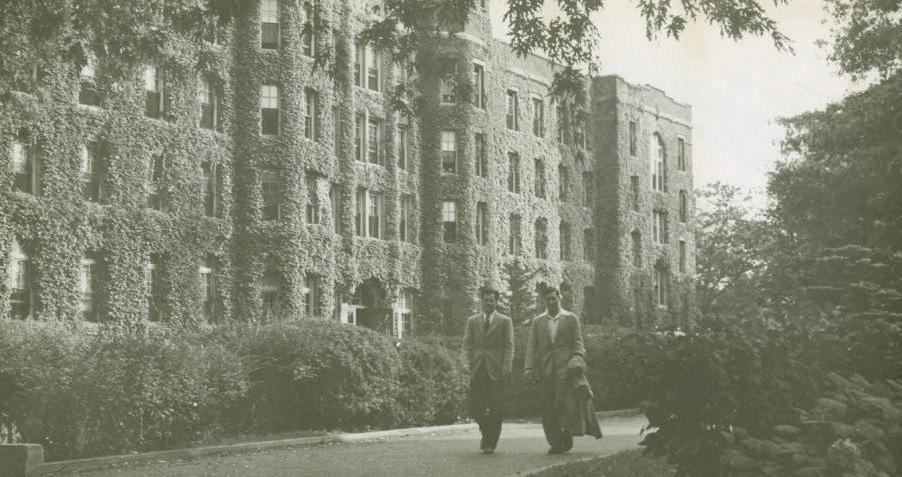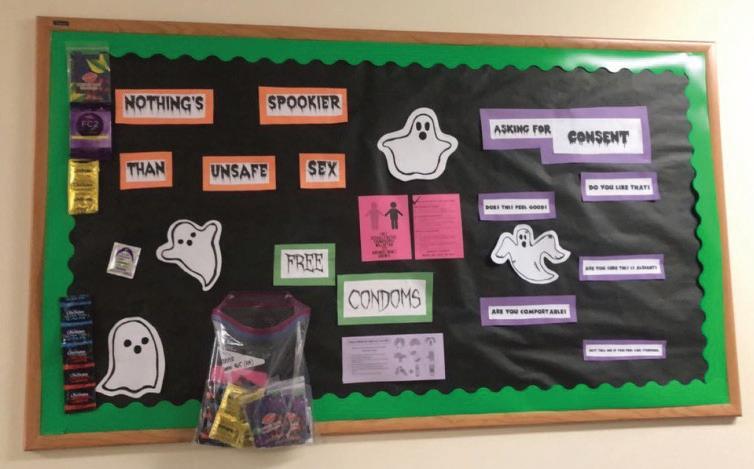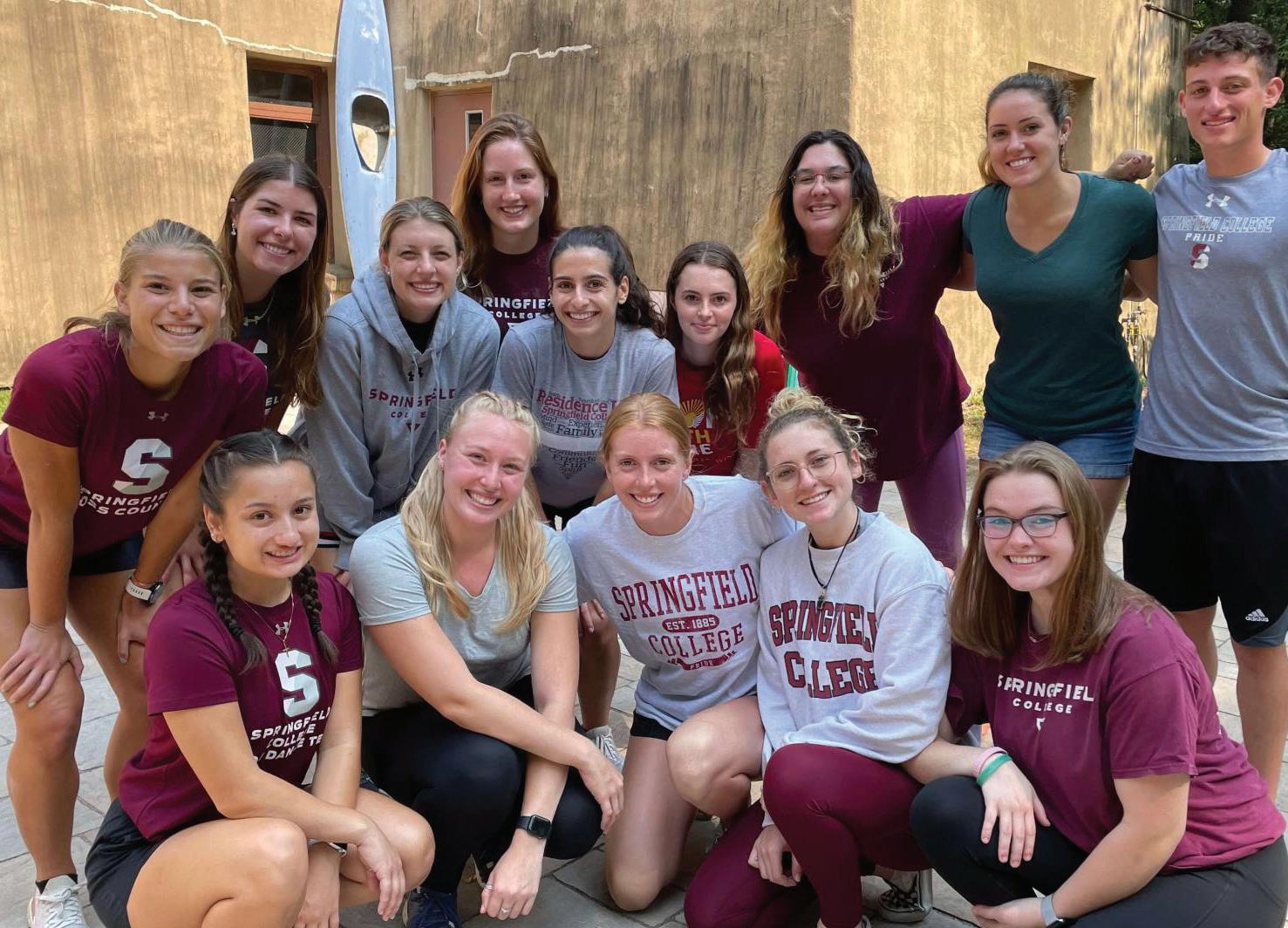
9 minute read
The story behind Alumni Hall
Two students walk around Alumni Hall around the 1940s. (Photo Courtesy of Springfield College)
The unique history of Alumni Hall
Advertisement
Springfield College’s longest standing dormitory was once used as a hospital during World War II and recently became co-ed.
Tucked away in the corner of campus, standing tall above Lake Massasoit, rests Springfield College’s oldest standing student housing building - Alumni Hall.
In June of 1926, contracts for the construction of a new men’s dormitory were awarded to the E.J. Pinney Company, back when the college still held the International YMCA College name. On September 22nd, the building’s cornerstone was laid. Inside of that cornerstone resides a list of the 1,041 Springfield Alumni who contributed to the hall’s construction; hence, where the name originated.
One year after the cornerstone was laid, Alumni Hall was completed. It wasn’t until June of 1930 that the building was dedicated, however, when all the funds were officially received. According to the Springfield College Archives, at the time of the dedication, it was said, “The building will grow old in time. But the spiritual values which it symbolizes defy time and circumstance…the spirit will endure long after the ‘New Dorm’ has become old.”
Alumni Hall continued to serve its purpose as an all men’s dormitory until October of 1944, when it was, in conjunction with the Administration building, used as a US Navy Convalescent during World War II. Alumni Hall was used as a hospital and most of the patients were housed there.
One wing was equipped for bed cases. The rest of the rooms were converted into hospital rooms that could house two-to-four men. The contract was later terminated in February of 1946, with the United States flag being lowered for the last time under US Navy direction on February 28. Following this, the building became a dormitory again.
Despite being such an old building, Alumni Hall has stayed pretty much untouched since its establishment in 1926, apart from necessary renovations. The biggest change has been on the inside, and it is not just the decor.
From the beginning in 1885, Springfield College was an all-male institution, and it stayed that
_ By Braedan Shea _ @othafishinthes1
way until 1950 when it was decided the best way for the school to grow was to allow women.
When women were finally allowed to attend Springfield College, the only housing option available was Abbey-Appleton Hall. Though there were other dorms available for them to live in, Alumni Hall was off limits to women for a full 67 years, until finally in 2017 the dormitory changed to coed housing.
In June of that same year, the time capsule that was placed inside of the cornerstone was opened during “Reunion Weekend.” Inside of the copper box used as the time capsule were pamphlets used in fundraising and to promote Springfield College and the YMCA, some fundraising posters, a couple of photographs, business cards, and some newspapers. Another unique item found inside was a typed seven-page list of all the Alumni who donated to the construction.
Today, Alumni Hall remains largely unchanged. Apart from who was living in the building, it still has stayed relatively the same. The Carlisle Foyer, donated by Mr. S. Richard Carlisle of Springfield, and the MacLean Terrace, named in recognition of Mrs. Charles F. MacLean of New York City, are still used to hold gatherings, presentations and student events for all students to enjoy, providing beautiful views of Lake Massasoit.
Practicing safe sex
The Student Advocates for Wellness are an on-campus resource for sexual education.

A bulletin board promoting safe sex in Alumni Hall. (Photo Courtesy of Brenna Lachapelle)
__ By Carley Crain __ @carley_crain12
Colorful condoms, toys of all shapes and sizes, purple packets of lubrication and other sex products fill boxes to the brim in the Wellness Center, all for use by the Student Advocates for Wellness group to promote safe sex on campus.
Organizations and students at Springfield College recognize that being sexually active during this time is a normal part of life, instead of feeding into societal stigmas surrounding the topic. Sex education, however, can be limited or nonexistent -- or completely abstinence-focused -- across most New England states, where a majority of Springfield students are from, according to the74million. org. In Massachusetts, for example, schools are not required to teach sex education.
However, a new law called the Healthy Youth Act was passed in Massachusetts in 2020. It states that in schools where sex education is part of the curriculum, they must “ensure the curriculum covers reproduction and sexual development, how to discuss safe sexual activity, human development changes, anatomy, the benefits of abstinence and importance of contraceptives, healthy relationships, and communication skills.” The law also mandates that different sexual identities must be covered.
States like Vermont, however, require sex education, but topics such as consent are not mandatory, while abstinence is an obligatory topic in their sex curriculum.
Essentially, students who come to Springfield from the New England States may not be educated or informed on safe sex. Instead, they may have been steered away from being sexually active, despite it being a normal desire by young students.
The Student Advocates for Wellness, Resident Assistants and the Health Center are working hard to change this narrative and reteach students an entirely different perspective regarding sex.
“I came from a high school where I got no sex education, and I think it is very important for sex education to be taught in classrooms or residential halls during your freshman year because some people have never heard of this,” said junior Arianna Vessicchio, who is involved with the Student Advocates. “I came from an abstinence-only education and that was all I was told to do. People come to college and they want to explore, so we just want to keep them safe.”
The Health Center is a great resource for students on campus to discuss their sexual health with professionals in a confidential and non-judgemental setting. Students who are interested in learning more about different contraceptive methods can reach out, as they are allowed to prescribe all types of birth control except Nexplanon and IUDs.
All students on campus are required to have health insurance, and by law according to Planned Parenthood, birth control is fully covered under all health insurance plans due to the Affordable Care Act. Emergency Contraceptives, like Plan B, are also available for $20 at the Health Center, which is a fraction of the cost compared to local pharmacies, where it is retailed at $50.
Pregnancy testing is done at the Health Center and comes at no cost, which is a much more
accessible and quicker option for students who may not be able to afford pregnancy tests at the store. The Health Center also offers STI and STD testing for all students, regardless if they are showing symptoms or not.
The most common STD on campus is Chlamydia, according to Debbie Low, a nurse at the Health Center. Chlamydia often does not present symptoms but is very treatable with antibiotics. Having an STD as a college student is fairly common, despite its negative connotations. In fact, according to HealthSnub.org, one in four college students has had an STD. Low recommends that students get tested once a year for STDs and STI’s.
The Health Center in the past has held STI and STD clinics in the Campus Union and hopes to plan more of these events in the future.
“It was a way where we tried to de-stigmatize STI screening and get as many people as we could to send a sample in,” said Low.
For students who are worried about privacy, specifically from family members, lab tests may result in billing information being sent to parents or guardians. In this case, the Health Center recommends going to Planned Parenthood in Springfield, where STD and STI testing is not billed to insurance. At Planned Parenthood, patients are allowed to pay on a fee basis, so insurance is not involved at all. However, pregnancy tests at the Health Center are free and do not get billed to a student’s health insurance.
“I think when people think about Planned Parenthood, their minds go right to abortion,” said Low. “Yes, they do abortions but they do everything when it comes to women’s health, and really sexual health in general. They are an awesome resource in our area especially for those who are trying to get out of their insurance.”
Pap smears -- a test that is recommended for sexually active indivduals who idenitfy as women at around 21 years of age -- can be done at the Health Center as well. Additionally, medication for students who identify as men who are having intercourse with other men can be prescribed PrEP at the Health Center or at Planned Parenthood, which can help prevent HIV.
“We really like when students come in for this kind of stuff because it gives us a chance to have a good, educational conversation,” said Low.
The Student Advocates for Wellness focus their efforts and programming on sex positivity and safety. The group’s main programs include “Let’s Talk About Sex,” which are presentations that are targeted towards freshman, “Good Vibrations,” which is usually catered to upperclassman about how to use sex toys properly, and “Contactless Condoms,” a service where different types of condoms are delievered to an individual’s dorm room. Students who are interested in receiving free condoms can click the link in the Springfield Student Advocate’s Instagram bio (@sc_studentadvocates) to fill out a quick form.
“It is a judgment free program; we just drop them off and not ask any questions for who it is for,” said junior Rachel Perry, a student who is involved with the Student Advocates.
The group is hosting their first Sex in the Dark event on March 8th, where students and staff will be answering questions about sex in a completly dark Fuller Arts Center. The club is hoping this event will make students feel more comfortable talking about sex openly.
Resident Assistant’s (RA’s) are not required to talk to their residents about safe sex, but many make it a priorty to do so. Junior Brenna Lachapelle, an RA in Alumni Hall, understands the benefits of promoting safe sex to her residents. She has created multiple bulletin boards on her floor that help students understand what they can do when having sex to stay healthy and safe.
“As an RA there are no requirments around promoting safe sex, so it is really up to us as individuals to chose weather we incorporate sex education into RA programming,” said Lachapelle. “RAs are responsible for making a new bulletin board once a month, so I try and make a bulletin board each semester regarding sex education and resources.
“For example, around Halloween-time my bulletin board was titled, ‘Nothing is spookier than unsafe sex,’ and it included STD statistics, tips on asking for consent and free condoms,” continued Lachapelle.
Springfield College prides itself on inclusivity and diversity. Organizations like the Student Advocates and the Health Center are putting this into practice and making sure students are comfortable with their personal health and sexuality.

The Student Advocates for Wellness. (Photo Courtesy of Springfield College Archives)




